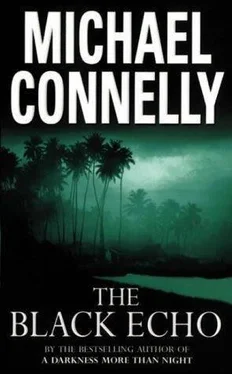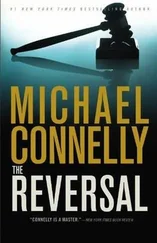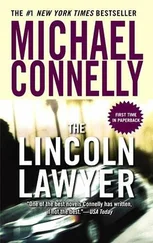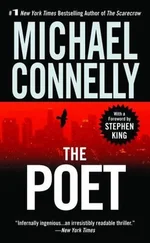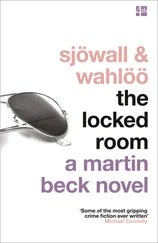She closed the notebook and put it in her purse. Then she finally looked up at him. There was a knocking from inside the interview room. Sharkey was looking at himself in the mirrored window of the door. But they both ignored him and Wish just drilled Bosch with her eyes.
“You always get this way when a woman turns you down for dinner?” she asked calmly.
“That’s got nothing to do with it and you know it.”
“Sure. I know it.” She started to walk away, then said, “Let’s say nineA.M., we meet at the bureau again?”
He didn’t answer and then she did walk away, toward the squad room door. Sharkey pounded on his door again, and Bosch looked over and saw the boy picking the acne on his face in the door’s mirror. Wish turned once more before she was out of the room.
“I wasn’t talking about my little brother,” she said. “He was my big brother, actually. And I was talking about a long time ago. About the way he looked when I was a little girl and he was going away for a while, to Vietnam.”
Bosch didn’t look at her. He couldn’t. He realized what was coming.
“I remember how he looked then,” she said, “because it was the last time I saw him. It sticks with you. He was one of the ones that didn’t come back.”
She walked out.
***
Harry ate the last slice of pizza. It was cold and he hated anchovies and he felt he deserved it that way. Same for the Coke, which was warm. Afterward, he sat at the homicide table and made calls until he found an empty bed, rather, an empty space, in one of the no-questions-asked shelters near the Boulevard. At Home Street Home they didn’t try to send runaways back to where they came from. They knew in most cases home was a worse nightmare than the streets. They just gave the children a safe place to sleep and then tried to send them off to any place but Hollywood.
He checked out an unmarked car and drove Sharkey to his motorbike. It would not fit in the trunk, so Bosch made a deal with the boy. Sharkey would ride the bike to the shelter and Bosch would follow. When the boy got there and got checked in, Bosch would give him back his money and wallet and cigarettes. But not the Polaroids and the joint. Those went into the trash. Sharkey didn’t like it but he did it. Bosch told him to hang around the shelter a couple of days, though he knew the boy would probably split first thing in the morning.
“I found you once. If I need to, I can do it again,” he said as the boy locked his bike up outside the home.
“I know, I know,” Sharkey said.
It was an idle threat. Bosch knew that he had found Sharkey when the boy didn’t know he was being looked for. It would be a different story if he wanted to hide. Bosch gave the boy one of his cheap business cards and told him to give a call if he thought of anything that would help.
“That would help you or me?” Sharkey asked.
Bosch didn’t answer. He got back in the car and drove back to the station on Wilcox, watching the mirror for signs of a tail. He didn’t see any. After checking the car in he went to his desk and picked up the FBI files. He went to the watch office, where the night lieutenant called one of his patrol units in to give Bosch a lift to the Federal Building. The patrol officer was a young cop with a quarter-inch hairdo. Asian. Bosch had heard around the station that he was called Gung Ho. They rode in silence the whole twenty minutes to the Federal Building.
Harry got home by nine. The red light on his phone machine was blinking but there was no message, just the sound of someone hanging up. He turned on the radio for the Dodgers game, but then he turned it off, tired of hearing people talk. He put CDs by Sonny Rollins, Frank Morgan, and Branford Marsalis into the stereo and listened to the saxophone instead. He spread the files out on the table in the dining room and turned the cap on a bottle of beer. Alcohol and jazz, he thought as he swallowed. Sleeping with your clothes on. You’re a cliché cop, Bosch. An open book. And no different from the dozen other fools who must hit on her every day. Just stick to the business in front of you. And don’t hope for anything else. He opened the file on Meadows, carefully reading every page, whereas before, in the car with Wish, he had only skimmed.
Meadows was an enigma to Bosch. A pillhead, a heroin user, but a soldier who had re-upped to stay in Vietnam. Even after they took him out of the tunnels, he stayed. In 1970, after two years in the tunnels, he was assigned to a military police unit attached to the American embassy in Saigon. Never saw enemy action again but stayed right up to the end. After the treaty and pullout of 1973, he got a discharge and stayed on again, this time as one of the civilian advisers attached to the embassy. Everybody was going home, but not Meadows. He didn’t leave until April 30, 1975, the day of the fall of Saigon. He was on a helicopter and then a plane ferrying refugees out of the country, on their way to the United States. That was his last government assignment: security on the massive refugee transport to the Philippines and then to the States.
According to the records, Meadows stayed in Southern California after coming back. But his skills were limited to military police, tunnel killer, and drug dealer. There was an LAPD application in the file that was marked rejected. He failed the drug test. Next in the file was a National Criminal Intelligence Computer sheet that showed Meadows’s record. His first arrest, for possession of heroin, was in 1978. Probation. The next year, he was popped again, this time for possession with intent to sell. He pleaded it out to simple possession and got eighteen months at Wayside Honor Rancho. He did ten of them. The next two years were marked by frequent arrests on marks beefs-fresh needle tracks being a misdemeanor good for sixty days in county lockup. It looked like Meadows was riding the revolving door at county until 1981, when he went away for some substantial time. It was for attempted robbery, a federal beef. The NCIC printout didn’t say if it was bank robbery, but Bosch figured it had to be to bring the feds in. The sheet said Meadows was sentenced to four years at Lompoc and served two.
He wasn’t out but a few months before he was picked up for a bank robbery. They must have had him cold. He pleaded guilty and took five years back to Lompoc. He would have been out in three but two years into the sentence he was busted in an escape attempt. He got five more years and was transferred to Terminal Island.
Meadows was paroled from TI in 1988. All those years in stir, Bosch thought. He never knew, never heard from him. What would he have done if he had heard? He thought about that for a moment. It probably changed Meadows more than the war. He was paroled to a halfway house for Vietnam vets. The place was called Charlie Company and was on a farm north of Ventura, about forty miles from Los Angeles. He stayed there nearly a year.
After that there were no further contacts, according to Meadows’s sheet. The marks beef that had prompted Meadows to call Bosch a year earlier had never been processed. It wasn’t on the sheet. No other known contact with police upon his release from prison.
There was another sheet in the package. This one was handwritten and Bosch guessed it was Wish’s clean, legible hand. It was a work and home history. Gathered from records searches of Social Security and DMV records, the entries ran vertically down the left side of the paper. But there were gaps. Time periods unaccounted for. Meadows had worked for the Southern California Water District when he first came back from Vietnam. He was a pipeline inspector. He lost the job after four months for excessive tardiness and sick-outs. From there he must have tried his hand at dealing heroin, because the next lawful employment was not listed until after he got out of Wayside in 1979. He went to work for DWP as an underground inspector-storm drainage division. Lost the job six months later for the same reasons as with the water district. There were a few other sporadic employments. After he left Charlie Company he caught on with a gold mining company in the Santa Clarita Valley for a few months. Nothing else.
Читать дальше
